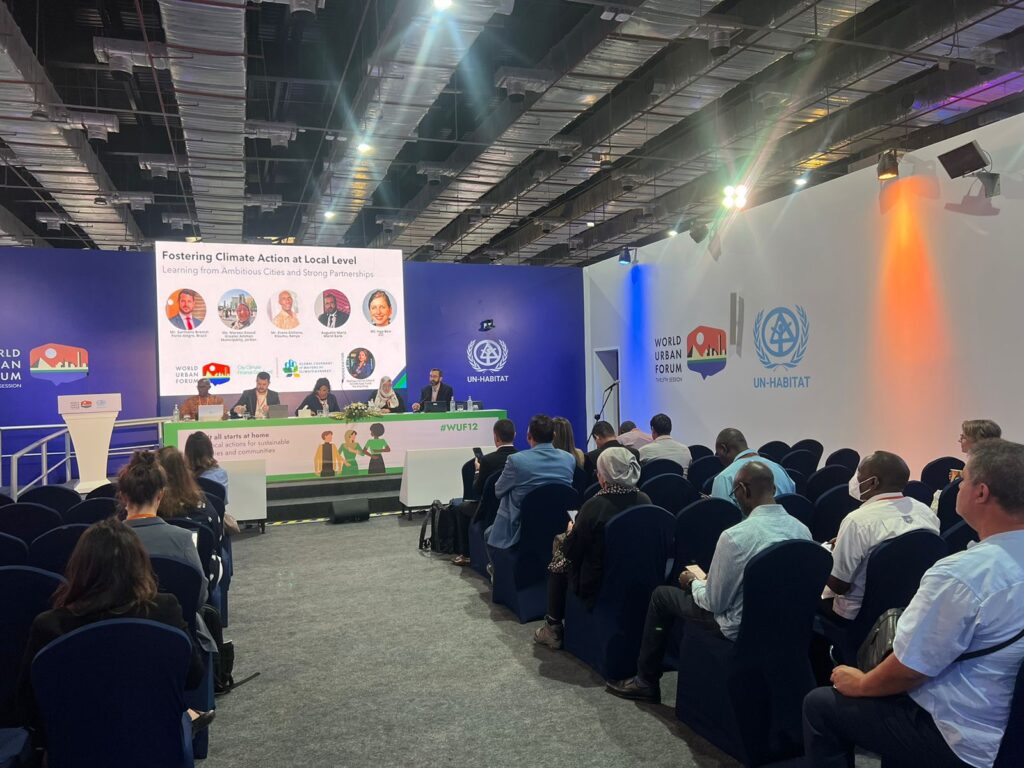
Gap Fund session at WUF12 highlights the power of partnerships for climate action
Cairo, November 2024 – At the World Urban Forum 12 (WUF12) in Cairo, the session titled “Fostering Climate Action at the Local Level: Learning from Ambitious Cities and Strong Partnerships” explored how partnerships and local expertise are essential in addressing today’s climate challenges. Moderated by Melissa Kerim, Engagement Lead for Africa at the GCOM-Gap Fund Partnership, the panel featured speakers from World Bank, Kisumu, Kenya, Porto Alegre, Brazil, and Greater Amman Municipality. Each panelist shared insights on their city’s unique experiences, emphasising the role of community-driven action and strong partnerships in achieving effective, sustainable climate solutions.
Knowledge Sharing and the Power of Partnerships
Augustin Maria, Global Lead for Cities and Climate Change at the World Bank and Program Manager for the City Climate Finance Gap Fund, opened the session by underscoring the importance of collective knowledge in urban resilience. “The initiative has generated a lot of knowledge, so it’s very important to ensure that this knowledge is exchanged between cities,” he stated. Maria described how the Gap Fund has provided early-stage support to hundreds of cities since its 2019 launch, bridging gaps in technical and financial capacities. He highlighted the transformative role of partnerships among cities, technical experts, and multilateral development banks in equipping cities with the tools and resources needed to advance their climate projects.
Amman’s Climate Resilience Journey
Representing Amman, Nisreen Daoud, Manager of Sustainable Development and Amman Resilience Unit, discussed her city’s strides in integrating climate resilience into urban planning to address challenges like urban sprawl and infrastructure limitations. Amman’s climate action plan, which targets carbon neutrality by 2050, covers key sectors such as transportation, waste management, and energy. “Our partnership with the Gap Fund allowed us to assess our strengths and weaknesses in a structured way,” Daoud explained. By involving all stakeholders in planning, Amman has been able to create a more inclusive and data-driven approach to resilience. “Community engagement and empowerment are essential for long-term sustainability,” she added, noting that the city’s data-driven methods have enhanced their capacity to prioritise and allocate resources effectively.
Porto Alegre’s Resilience Amid Flooding
In Brazil, Germano Bremm, Secretary of Environment and Sustainability for Porto Alegre, shared his city’s recent challenges with severe flooding, which emphasised the need for proactive resilience planning. “With 30% of our city affected, the pressure on us to respond quickly was immense,” Bremm said. He noted that the Gap Fund-supported climate action plan provided a critical roadmap for both immediate response and long-term recovery efforts, including new climate monitoring tools and a dedicated adaptation team. Bremm stressed the importance of involving the public in these efforts, noting that resilience planning requires a collective, city-wide commitment beyond any single department.
Kisumu’s Waste-to-Biogas Project
Evans Gichana, Director of the Climate Change Department in Kisumu, described the city’s waste-to-biogas project as a prime example of sustainable, community-driven climate action. Supported by the Gap Fund, the project transforms organic waste into biogas, helping Kisumu address waste management while promoting renewable energy. “Our city generates around 500 tons of waste each day, and the question was: how do we turn this into an opportunity?” Gichana shared. He explained how public participation was key to identifying waste management as a priority, underscoring that “when local people have a stake in a project, it’s more likely to succeed in the long term.” The project’s feasibility study, now near completion, paves the way for expanded sustainable solutions in Kisumu and across similar regions.
Key Takeaways
The session underscored essential lessons for advancing local climate action:
- Data-Driven Decisions: Using reliable data to guide actions ensures that resources are effectively targeted. In Amman, data was central to setting clear, achievable goals.
- Community Engagement and Empowerment: Each panellist highlighted that community-driven projects lead to greater commitment and project sustainability. By fostering a sense of ownership, cities can ensure long-term maintenance and resilience.
- Local Coordination and Leadership: Political will and dedicated local leaders are essential for successful climate initiatives. Porto Alegre’s and Kisumu’s city leaders were noted for their pivotal roles in securing resources and fostering a supportive environment for climate action.
- Capacity Building: Empowering municipal teams and community leaders is crucial for sustainable, people-driven climate action. Cities like Amman have focused on building the skills necessary for resilience at all levels of government.
Looking Ahead
As cities around the world confront intensifying climate threats, initiatives like the City Climate Finance Gap Fund provide essential support. Looking forward, the Global Covenant of Mayors for Climate & Energy (GCoM) has committed to working alongside the Gap Fund to expand access to early-stage technical assistance, ensuring more cities have the resources to develop and implement climate projects. “We need to connect local action with national frameworks, ensuring that cities aren’t working in isolation but are empowered with the resources and partnerships needed to succeed,” concluded Maria.
With tools like the Gap Fund and GCoM’s ongoing support, cities can continue to transform climate strategies into impactful, resilient urban projects that protect communities, enhance sustainability, and ensure a brighter future in the face of climate change.